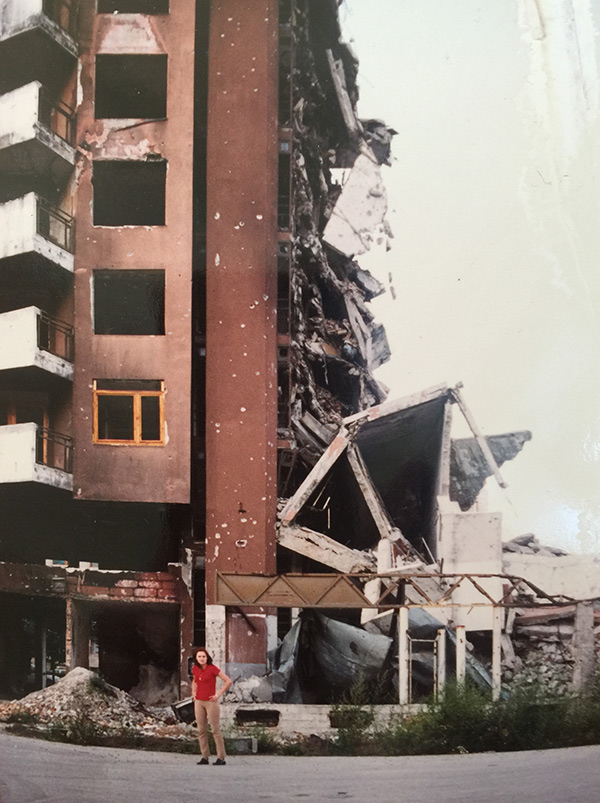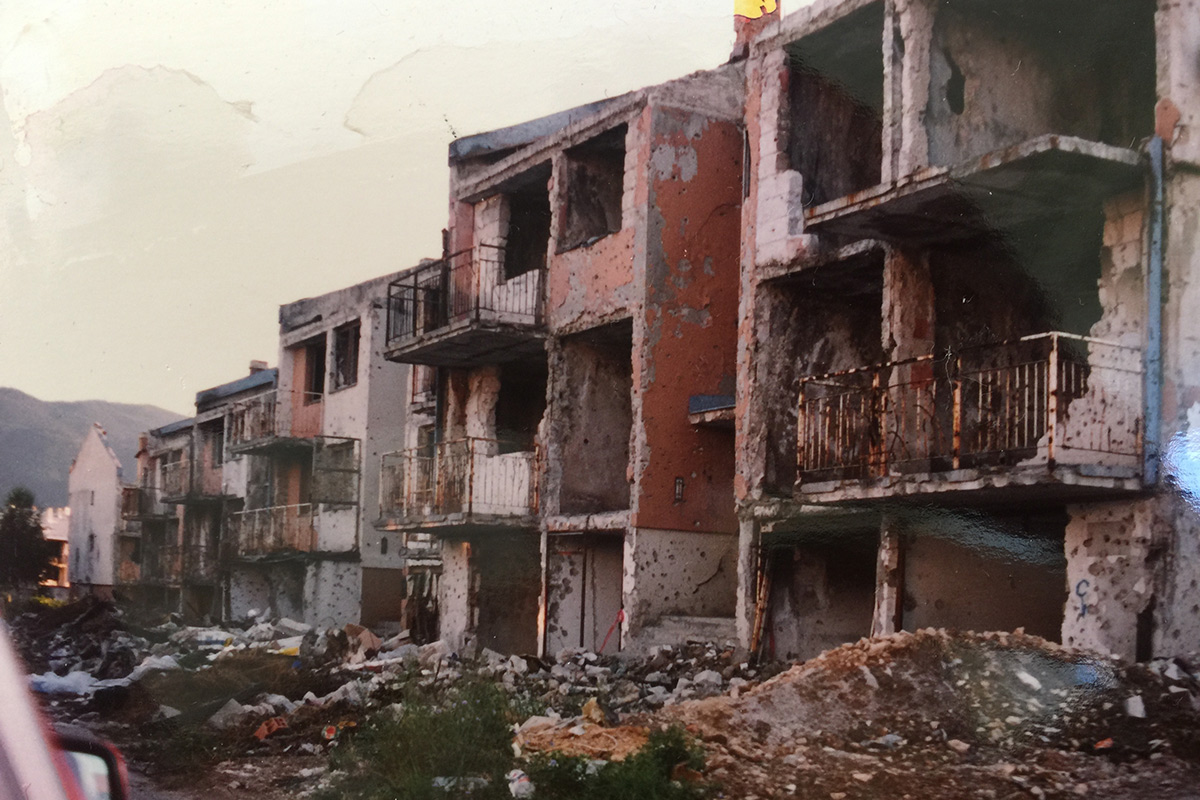“We need to be reminded to teach from the heart,” says Amra Sabic-El-Rayess.
For Sabic-El-Rayess – an authority on corruption and radical ultra-conservatism, a focus arising from her own experiences as a Muslim who fled her native Bosnia after surviving the ethnic cleansing there – such reminders have lately been coming from unexpected sources.
She has been making the most of them.
In October, she received a threatening email, veiled in religious language, which was investigated by police. After making sure that her students were not at risk, Sabic-El-Rayess, Associate Professor of Practice in TC’s Department of Education Policy & Social Analysis, responded by devoting classroom time to deconstructing the email “to analyze this person and why he’s in this state of mind.” Only at the end of the class did she reveal that the threat had been real, and that she herself was the recipient.

OFFERING ANOTHER PATH The author in Sarajevo years ago. Sabic-El-Rayess says she's writing her book to offer "young people who might feel excluded and powerless” an alternative to violence and hate.
Later that same month, Sabic-El-Rayess was recruited by Lara Stein, Executive Director of Women’s March Global, to the organization’s advisory board, whose members are all recognized thought leaders in their fields. Each brings a unique perspective to the question of how to address a number of critical issues, including this year’s focus on preventing violence against women. Sabic-El-Rayess’s approach: To work toward ending radicalization in each of the 36 countries where Women’s March Global is active, in particular by fostering difficult conversations among people with widely differing viewpoints. “When we no longer speak with those at the other end of the spectrum, the silence leads to a build-up of anger and frustration that at some point becomes violence,” she says.
But the most surprising reminder of all came in December, from the literary agency with whom Sabic-El-Rayess was discussing a book she is writing on radicalization. The work, as she’d envisioned it, was going to discuss the emergence of Bosnia’s ethnic divisions and the more recent rise of Salafism, an ultraconservative form of Islam that, as she has previously written, has spread globally by winning converts “from the margins of the powerless” to the cause of “saving Islam from destruction by the West” by any means necessary.
But the agency countered with an entirely different approach.
“They said, ‘That’s great, but you’re only going to reach an adult market. We really want to magnify your voice – so how about also writing a second book for young adults about your experiences during the war?’” Sabic-El-Rayess recalls. “I was fascinated by the idea that I would have an opportunity to empower and educate youth around the world by sharing my story of survival. I’d never written for that audience, but I decided to give it a try.”
The result: In early January, Bloomsbury announced that it has signed Sabic-El-Rayess and a co-writer, Laura Sullivan, to “a six-figure deal” to write a memoir, targeted to young adults worldwide, that is tentatively titled “Maci.” The word, which means “kitty” in Bosnian, is a reference to a stray cat that attached itself to the author’s family during the Serbian military siege and, as Sabic-El-Rayess tells it, not only saved her own life and her brother’s, but became a symbol of “how love can come from the most unexpected places, and how beauty and hope can flourish amid hate and destruction.” The book is slated for publication in 2020.
“I was fascinated by the idea that I would have an opportunity to empower and educate youth around the world by sharing my story of survival. I’d never written for that audience, but I decided to give it a try.”
—Amra Sabic-El-Rayess
“I wanted my book to be read by people who could potentially be transformed by reading it, especially young people who might feel excluded and powerless – teens who are black or gay or immigrants or religious minorities or poor or unloved or simply those who feel neglected or invisible to others, and who might easily feel that they have no alternative but violence and hate,” she says. “Hopefully they will read this book, written by someone else who has experienced exclusion, and feel that there is another way.”
But as Sabic-El-Rayess sees it, the book is a parable about teaching, as well.
“I think that people in academia are coming to understand that neglecting the real world is going to make higher ed institutions obsolete,” she says. “That means engaging with students, helping them see how a subject or issue relates to them and why they should care. They can read our academic work online, so the challenge is, what can we bring to the classroom that adds an extra dimension?”
Writing her book has posed challenges for Sabic-El-Rayess – for example, how to write for not-quite-adults about issues such as mass killing, rape and torture, which were ever-present realities during the siege? – but the process has been cathartic as well.
“For years after I came to the States, it was difficult to talk about what I’d been through,” she says. But time has passed and the recent emergence of oppressive regimes has convinced her that the story needs to be told.
“I think that people in academia are coming to understand that neglecting the real world is going to make higher ed institutions obsolete. That means engaging with students, helping them see how a subject or issue relates to them and why they should care. They can read our academic work online, so the challenge is, what can we bring to the classroom that adds an extra dimension?”
—Amra Sabic-El-Rayess
Then, too, writing autobiographically also gives her the opportunity to let readers know that her religion is not about the extremism that dominates the headlines.
“During the Golden Age of Islam, Muslims made immense contributions in mathematics, astronomy, optics and other fields because they interpreted Islam to be a call to search for all forms of knowledge,” she says. “But radicalized groups such as ISIS, which hold a very limited perception of Islam, have abandoned all kinds of knowledge. And that’s why teaching young people how diverse knowledge ought to be is the key to ending radicalization in all forms.”
To that end, Sabic-El-Rayess makes a special effort to mentor students – including those who aren’t in her courses, and even those at other institutions. Recently, at the request of faculty at New York City’s LaGuardia Community College, she met with a young woman who had been a victim of human trafficking.
“She came to TC to speak with me, and she was so terrified,” Sabic-El-Rayess recalls. “She thought I’d quiz her about her grades and scores. I said, ‘Where do you want to be in life? Maybe I can help you with advice on getting there.’ At the end, she said, ‘Our conversation has been everything I never expected to talk about.’ So a drop of humanity in a professional conversation can make a huge difference. If I can inspire a student to be confident and believe, they will become.”
